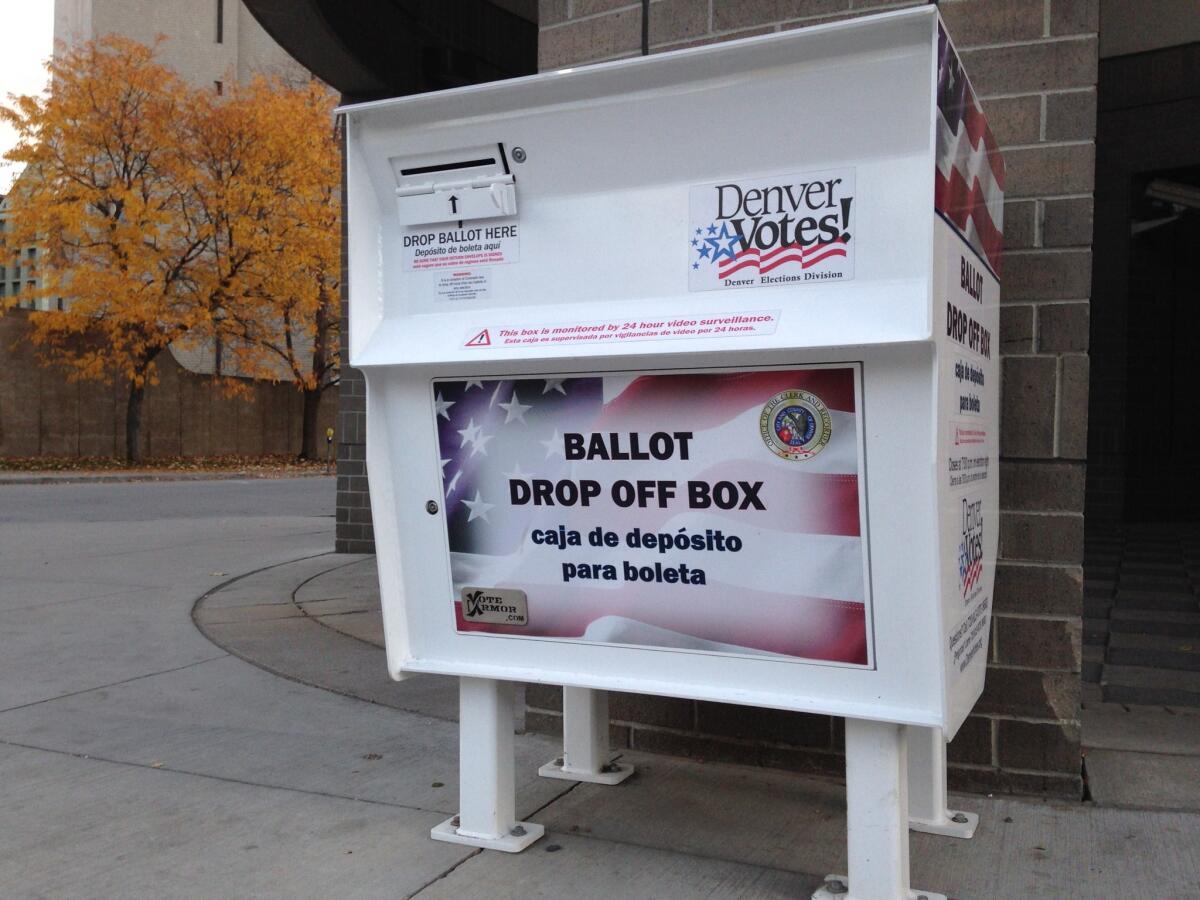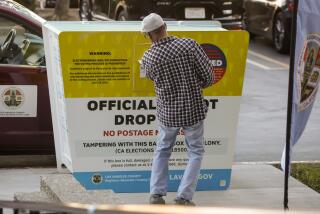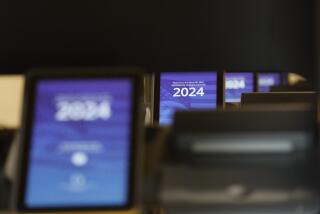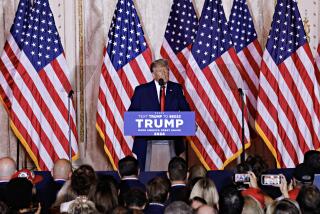Coronavirus threatens the November election. Can vote by mail save it?

As states scramble to postpone presidential primaries, election workers abandon their posts and voters worry about the risk of contagion in crowded polling places, the question of how the nation is going to pull off a general election in November has generated increasing anxiety.
Some states are much better prepared than others.
In a significant swath of the nation, however, most voters still lack the one viable option for casting ballots that doesn’t put their health at risk in a time of pandemic: voting by mail.
Now the decades-long push by advocates and many lawmakers to make that alternative universally available has gained new momentum amid a public health crisis. Backers are racing to overcome longstanding political barriers so that states that have resisted can start confronting the huge logistical challenges involved in a quick shift away from in-person voting.
“Ohio, Louisiana, Georgia and other states are showing that without vote-by-mail, states might not be able to hold elections at all,” Sen. Ron Wyden (D-Ore.) said in an email, referring to states that have postponed scheduled primaries. He and Sen. Amy Klobuchar (D-Minn.) are rallying colleagues behind their bill that would require all states to allow citizens to vote absentee.
“I understand that standing up a new election system will be a heavy lift, but in the face of this pandemic, vote by mail is the best choice we have to keep our democracy running,” Wyden said.
Casting ballots by mail — or at drop-off locations on and before election day — is a familiar habit in the West. California has allowed any adult citizen who cares to vote absentee to do so for years. Washington, Oregon and Colorado have already moved over to 100% mail or drop-off voting, with California headed in that direction.
Deeply Republican states like Utah also allow anyone to vote absentee.
Yet in 16 states concentrated mostly in the Northeast and the South, voters are expected to show up on election day unless they can claim one of a set of excuses for an absentee ballot.
Some states have been reluctant to meddle with a tradition of civic engagement on election day. More recently, states governed by Republicans have resisted a change after President Trump repeatedly — and falsely — suggested that reforms that bring down barriers to ballot access had led to widespread voter fraud by Democrats.
The rapidly spreading pandemic has some rethinking their rules. Connecticut, for example, has temporarily changed its restrictions to make concerns about the virus a valid excuse for anyone who wants to vote absentee.
But in some states, election officials are powerless to act without changes in state law or a mandate from Congress, which has the power to set rules for federal elections.
“We need emergency action now,” said Richard L. Hasen, an election law scholar at UC Irvine who advocates a temporary federal requirement that every voter in America have access to a mail-in ballot for the 2020 election.
“We cannot postpone the election because there are places under lockdown. We need to have a Plan B ready.”
Election experts stress that putting off the general election until things settle down is not an option. The Constitution does not allow a president to serve beyond four years without reelection. But some officials still see a conspiracy.
“No elected official or journalist should use a potential health concern to advance his or her own political agenda,” Alabama Secretary of State John H. Merrill said last week after a local columnist charged the state’s absentee voting restrictions invite an election-day meltdown. The state Legislature there has repeatedly rejected proposals for universal vote by mail.
A proposal passed by lawmakers in New Hampshire was vetoed in September by Republican Gov. Chris Sununu, who warned it would erode the state’s standing as a role model of civic engagement.
“Even if people agree this is an emergency and we may need to do this, it’s hard to just wash out of your mind thoughts you have had your entire life,” Charles Stewart III, a political science professor at MIT who focuses on voting, said of skeptical elections officials.
A voter survey he conducted recently found Democrats were far more heavily in favor of universal mail voting than were Republicans. The irony, he said, is that it was GOP public officials who played a key role a couple of decades ago in seeding the movement toward voting by mail.
These days, however, the pressure on election officials is coming mostly from Democrats, who are watching in dismay as their primary election has been disrupted in nearly half a dozen states.
Democratic National Committee Chairman Tom Perez on Tuesday implored states that have not yet held their primaries to embrace voting by mail instead of postponing their elections to a later date.
By the fall, the coronavirus crisis could have passed — or it could just be getting a second wind. In 1918, the deadly influenza pandemic that hit in the final year of World War I first appeared in the winter, subsided in the summer, then roared back in the fall, disrupting that year’s presidential campaign.
The consequences of giving voters no alternative in November but to show up at polls could be dramatic in states that continue to resist. Most poll workers are over age 60, putting them at high risk if COVID-19 is still spreading. Many may just decide not to show up, as was the case in some of the primaries held this week.
The need to sanitize machines after every voter, possibly take the temperature of voters as they enter polling places and enforce social distancing — which could lead to historically long delays in both voting and tallying votes. That, in turn, could shake voter confidence in the integrity of the election.
“Are we going to say to people they can’t vote because they have a 100-degree temperature?” said Paul Gronke, director of the Early Voting Information Center at Reed College in Portland, Ore. “I think about all the complexities involved in trying to make polling places safe for people to cast ballots, and I get very nervous.”
Until this election cycle, Gronke had been reluctant to champion a federal mandate giving all voters access to absentee ballots, worrying it would be too heavy-handed. The outbreak has changed his thinking.
“We are in an emergency,” he said.
The prospects for the Wyden bill are uncertain. There are not yet any GOP co-sponsors for the proposal, which the senator has pushed in some fashion since 2006. But even if the Senate balks, election experts are hopeful more states will aim to expand mail-in voting for November on their own.
Time is fast running out. The logistical issues involved with shifting millions of voters over to mail-in ballots are monumental. Even many states that already encourage all residents to mail or drop off their ballots will probably struggle with the deluge, said Wendy Weiser, director of the Democracy Program at the Brennan Center for Justice at NYU School of Law.
“There is a huge amount that needs to be done to prepare for this,” Weiser said. She pointed to everything from the lack of vendors equipped to print so many ballots, to a potential shortage of the specific paper needed, to all the new equipment states would need to count and sort the votes.
There are other components for states to wrestle with: safeguards to ensure ballots are properly collected, finding and training large numbers of workers for what could prove a complicated undertaking, and putting in place backstops to avoid system malfunctions and clerical errors that can turn election day into a mess.
Even if the Wyden bill stalls again, lawmakers still may put money in the stimulus legislation moving through Congress to help states confront these logistical hurdles. Especially when the alternative could be a lot of Americans excluded from the ballot box come November.
“We don’t have flexibility on when this election is,” said Weiser. “There will be a very large number of people who will not be able to vote in person. It won’t be safe for them to do so. They need to have this option.”
More to Read
Get the L.A. Times Politics newsletter
Deeply reported insights into legislation, politics and policy from Sacramento, Washington and beyond. In your inbox three times per week.
You may occasionally receive promotional content from the Los Angeles Times.







